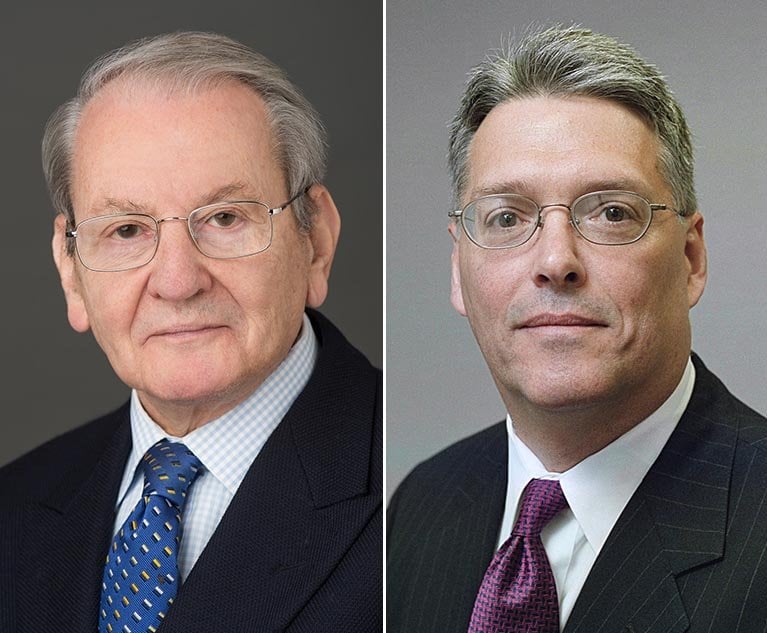 Thomas R. Newman, left, and Steven J. Ahmuty Jr. Courtesy photos
Thomas R. Newman, left, and Steven J. Ahmuty Jr. Courtesy photos Issues Not Raised Below
"'Barber' is one of the latest in a long line of cases invoking the preservation requirement to prevent the blindsiding of an adverse party," write Thomas R. Newman and Steven J. Ahmuty Jr.
September 03, 2024 at 12:00 PM
8 minute read
In Barber v. Crout-Woodard, 224 AD3d 966 (3d Dept. 2024), a conversion and replevin action against a real property owner, the plaintiff attempted to raise an unjust enrichment theory of liability for the first time on appeal. The Appellate Division declined to entertain this new argument, following the longstanding principle that "an appellate court should not, and will not, consider different theories or new questions, if proof might have been offered to refute or overcome them had they been presented at the trial." Id. at 967 (citation omitted). The court noted that "a finding of unjust enrichment is also fact-intensive and, as such, it was required to be raised before Supreme Court in order to be preserved for appellate review." Id. (citation omitted). Barber is one of the latest in a long line of cases invoking the preservation requirement to prevent the blindsiding of an adverse party.
There is an element of unfairness about seeking to reverse an order or judgment on a point of law not called to the trial court's attention and on which the court was not given the opportunity to rule and thereby correct its asserted error. Therefore, generally, to be available as a basis for review and reversal of a judgment on appeal, the issue relied on must have been raised in the trial court and not for the first time on appeal. An issue that might have been obviated by the submission of documentary evidence to the motion court may not be raised for the first time on appeal. First Intl. Bank v. Blankstein & Son, 59 NY2d 436, 447 (1983); Tortorello v. Carlin, 260 AD2d 201, 205 (1st Dept. 1999).
NOT FOR REPRINT
© 2025 ALM Global, LLC, All Rights Reserved. Request academic re-use from www.copyright.com. All other uses, submit a request to [email protected]. For more information visit Asset & Logo Licensing.
You Might Like
View All

Standing Spat: Split 2nd Circuit Lets Challenge to Pfizer Diversity Program Proceed


Trending Stories
Who Got The Work
J. Brugh Lower of Gibbons has entered an appearance for industrial equipment supplier Devco Corporation in a pending trademark infringement lawsuit. The suit, accusing the defendant of selling knock-off Graco products, was filed Dec. 18 in New Jersey District Court by Rivkin Radler on behalf of Graco Inc. and Graco Minnesota. The case, assigned to U.S. District Judge Zahid N. Quraishi, is 3:24-cv-11294, Graco Inc. et al v. Devco Corporation.
Who Got The Work
Rebecca Maller-Stein and Kent A. Yalowitz of Arnold & Porter Kaye Scholer have entered their appearances for Hanaco Venture Capital and its executives, Lior Prosor and David Frankel, in a pending securities lawsuit. The action, filed on Dec. 24 in New York Southern District Court by Zell, Aron & Co. on behalf of Goldeneye Advisors, accuses the defendants of negligently and fraudulently managing the plaintiff's $1 million investment. The case, assigned to U.S. District Judge Vernon S. Broderick, is 1:24-cv-09918, Goldeneye Advisors, LLC v. Hanaco Venture Capital, Ltd. et al.
Who Got The Work
Attorneys from A&O Shearman has stepped in as defense counsel for Toronto-Dominion Bank and other defendants in a pending securities class action. The suit, filed Dec. 11 in New York Southern District Court by Bleichmar Fonti & Auld, accuses the defendants of concealing the bank's 'pervasive' deficiencies in regards to its compliance with the Bank Secrecy Act and the quality of its anti-money laundering controls. The case, assigned to U.S. District Judge Arun Subramanian, is 1:24-cv-09445, Gonzalez v. The Toronto-Dominion Bank et al.
Who Got The Work
Crown Castle International, a Pennsylvania company providing shared communications infrastructure, has turned to Luke D. Wolf of Gordon Rees Scully Mansukhani to fend off a pending breach-of-contract lawsuit. The court action, filed Nov. 25 in Michigan Eastern District Court by Hooper Hathaway PC on behalf of The Town Residences LLC, accuses Crown Castle of failing to transfer approximately $30,000 in utility payments from T-Mobile in breach of a roof-top lease and assignment agreement. The case, assigned to U.S. District Judge Susan K. Declercq, is 2:24-cv-13131, The Town Residences LLC v. T-Mobile US, Inc. et al.
Who Got The Work
Wilfred P. Coronato and Daniel M. Schwartz of McCarter & English have stepped in as defense counsel to Electrolux Home Products Inc. in a pending product liability lawsuit. The court action, filed Nov. 26 in New York Eastern District Court by Poulos Lopiccolo PC and Nagel Rice LLP on behalf of David Stern, alleges that the defendant's refrigerators’ drawers and shelving repeatedly break and fall apart within months after purchase. The case, assigned to U.S. District Judge Joan M. Azrack, is 2:24-cv-08204, Stern v. Electrolux Home Products, Inc.
Featured Firms
Law Offices of Gary Martin Hays & Associates, P.C.
(470) 294-1674
Law Offices of Mark E. Salomone
(857) 444-6468
Smith & Hassler
(713) 739-1250






